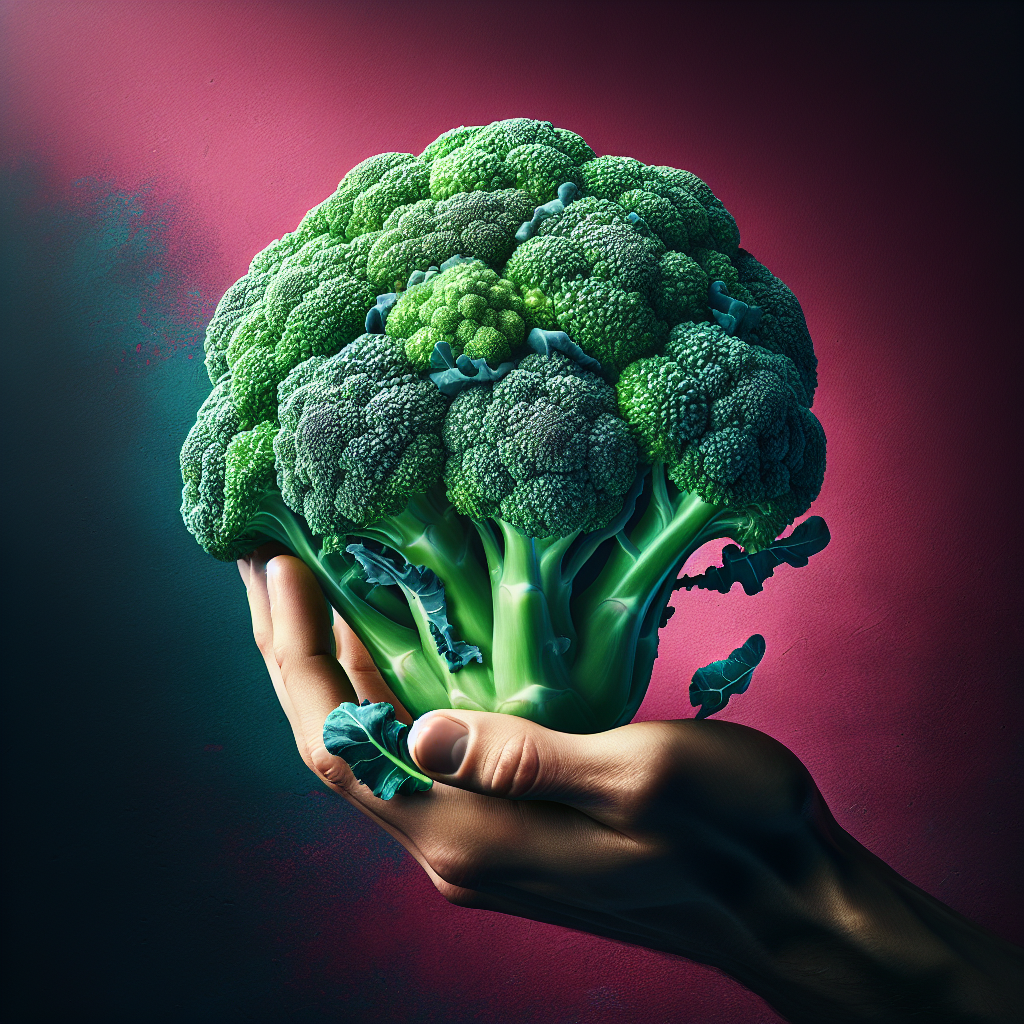cruciferous vegetables, such as broccoli, kale, and Brussels sprouts, have long been known to be packed with essential nutrients, but did you know that they also play a vital role in preventing cancer? These vegetables are not only delicious additions to your diet, but they also contain powerful compounds that have been shown to lower the risk of various types of cancer. In this article, we will explore the incredible benefits of consuming cruciferous vegetables and how they can contribute to a healthier, cancer-free lifestyle. So, get ready to discover a whole new appreciation for these humble yet remarkable greens!

Health Benefits of Cruciferous Vegetables
Rich in Antioxidants
Cruciferous vegetables, such as broccoli, cauliflower, kale, and Brussels sprouts, are known to be rich in antioxidants. Antioxidants are substances that help protect your cells from damage caused by unstable molecules called free radicals. By consuming cruciferous vegetables, you can increase your intake of antioxidants, which can help reduce the risk of chronic diseases, including cancer.
Anti-Inflammatory Properties
Inflammation is a natural response by the body to injury or infection. However, chronic inflammation can contribute to the development and progression of various diseases, including cancer. Cruciferous vegetables contain compounds that have anti-inflammatory properties, helping to reduce the levels of inflammation in your body. Incorporating these vegetables into your diet can support overall health and potentially reduce the risk of cancer.
High in Fiber
Cruciferous vegetables are an excellent source of dietary fiber. Fiber plays a crucial role in maintaining digestive health by promoting regular bowel movements and preventing constipation. Additionally, a high-fiber diet has been associated with a reduced risk of colorectal cancer. By including cruciferous vegetables in your meals, you can increase your fiber intake and support a healthy digestive system.
Detoxification Support
The liver is responsible for detoxifying harmful substances in the body, including certain chemicals and toxins. Cruciferous vegetables, such as cabbage and broccoli, contain compounds that support the liver’s detoxification process. These vegetables contain sulfur compounds that can enhance the activity of detoxification enzymes in the liver. Including cruciferous vegetables in your diet can assist in promoting a healthy liver and aiding the body’s natural detoxification processes.
Boost Immune System
A strong immune system is essential for overall health and plays a crucial role in cancer prevention. Cruciferous vegetables are rich in vitamins, minerals, and phytochemicals that can support immune function. Vitamin C, found in broccoli and Brussels sprouts, is known for its immune-boosting properties. By incorporating cruciferous vegetables into your diet, you can provide your body with the necessary nutrients to strengthen your immune system and potentially reduce the risk of cancer.
Cruciferous Vegetables and Cancer Prevention
Chemoprotective Effects
Several studies have shown that cruciferous vegetables have chemoprotective effects, meaning they help protect against the development and growth of cancer cells. The unique combination of phytochemicals, vitamins, and minerals found in these vegetables contributes to their cancer-fighting properties. By regularly consuming cruciferous vegetables, you can potentially reduce the risk of various types of cancer.
Anticancer Compounds
Cruciferous vegetables contain a group of compounds called glucosinolates, which are broken down into various biologically active substances during digestion. One of these compounds, sulforaphane, has been extensively studied for its anticancer properties. Sulforaphane has been shown to inhibit the growth and spread of cancer cells and induce cell death in laboratory studies. By consuming cruciferous vegetables, you can increase your intake of these anticancer compounds and potentially help prevent cancer.
Potential Role in Prostate Cancer Prevention
Prostate cancer is one of the most common types of cancer among men. Research suggests that cruciferous vegetables may play a role in prostate cancer prevention. Epidemiological studies have found that individuals who consume more cruciferous vegetables have a lower risk of developing prostate cancer. The exact mechanisms behind this protective effect are still being studied but may involve the regulation of androgen (male hormone) levels and inhibition of cancer cell growth.
Breast Cancer Prevention
Recent studies have also explored the relationship between cruciferous vegetable consumption and breast cancer prevention. Some research suggests that cruciferous vegetables, particularly those rich in glucosinolates, may have a protective effect against breast cancer. These vegetables may influence estrogen metabolism, which is known to play a role in breast cancer development. By incorporating cruciferous vegetables into your diet, you may potentially reduce the risk of breast cancer.
Colorectal Cancer Prevention
Colorectal cancer is the third most common cancer worldwide. Cruciferous vegetables have shown promise in preventing and reducing the risk of colorectal cancer. Studies have found that individuals who consume higher amounts of cruciferous vegetables have a lower risk of developing colorectal cancer. The fiber content in these vegetables aids in promoting healthy bowel movements and may help prevent the accumulation of harmful substances in the colon.
Sulforaphane: A Key Component in Cruciferous Vegetables
How sulforaphane works
Sulforaphane is a bioactive compound found in cruciferous vegetables that has gained significant attention for its potential anticancer effects. It works by modulating various cellular pathways associated with cancer development and progression. Sulforaphane targets cancer cells, impairs their ability to multiply, and induces programmed cell death, known as apoptosis. These actions make sulforaphane a promising candidate for cancer prevention and treatment.
Induction of Phase II Enzymes
One of the notable effects of sulforaphane is its ability to induce the expression of phase II detoxification enzymes. These enzymes play a vital role in detoxifying harmful substances and metabolizing potential carcinogens. By increasing the activity of these enzymes, sulforaphane helps the body eliminate toxins and reduce the risk of DNA damage that can lead to cancer development.
Anti-Cancer Effects of Sulforaphane
Numerous studies have demonstrated the potential anti-cancer effects of sulforaphane. In laboratory experiments, sulforaphane has been shown to inhibit the growth and division of cancer cells. It can also induce apoptosis in cancer cells, preventing their uncontrolled proliferation. Additionally, sulforaphane may disrupt the formation of blood vessels that supply nutrients to tumors, potentially inhibiting tumor growth.
Effects on Cancer Stem Cells
Cancer stem cells are a small population of cells within tumors that are responsible for initiating and sustaining cancer growth. Targeting these cancer stem cells is crucial for effective cancer treatment. Sulforaphane has shown the ability to selectively target and eliminate cancer stem cells, inhibiting their ability to perpetuate tumor growth. This promising finding suggests that sulforaphane could be a valuable adjunct therapy for cancer treatment.
Synergistic Effects with Chemotherapy
Sulforaphane has been found to have synergistic effects when combined with certain chemotherapy drugs. Studies have shown that sulforaphane can enhance the efficacy of chemotherapy drugs by increasing their uptake and targeting cancer cells more effectively. This suggests that incorporating sulforaphane-rich cruciferous vegetables into the diet alongside conventional cancer treatments may potentially improve treatment outcomes.
Cruciferous Vegetables and Prostate Cancer Prevention
Epidemiological Studies on Cruciferous Vegetables and Prostate Cancer
Epidemiological studies have shown a consistent inverse relationship between cruciferous vegetable consumption and the risk of prostate cancer. Men who consume higher amounts of cruciferous vegetables are found to have a lower risk of developing prostate cancer. While these observational studies provide valuable insights, more research is needed to establish a definitive relationship and understand the underlying mechanisms.
Mechanisms of Action
Cruciferous vegetables contain bioactive compounds, including sulforaphane, that may play a role in preventing prostate cancer. These compounds are believed to modulate cellular pathways involved in prostate cancer development. By targeting and inhibiting the growth of cancer cells, cruciferous vegetables may offer protective effects against prostate cancer.
Inhibition of Growth and Spread of Prostate Cancer Cells
Laboratory studies have shown that cruciferous vegetables and their bioactive compounds can inhibit the growth and spread of prostate cancer cells. These vegetables may induce apoptosis in cancer cells, limiting their ability to multiply and metastasize. Consuming cruciferous vegetables regularly could potentially help slow down the progression of prostate cancer.
Effects on Androgen Regulation
Androgens, such as testosterone, play a critical role in prostate cancer development and growth. Cruciferous vegetables may influence androgen regulation and metabolism, potentially reducing the risk of prostate cancer. By incorporating these vegetables into your diet, you can contribute to regulating and maintaining healthy levels of androgens in your body.

Cruciferous Vegetables and Breast Cancer Prevention
Studies on Cruciferous Vegetables and Breast Cancer
Research on the relationship between cruciferous vegetable consumption and breast cancer prevention has yielded promising findings. Some studies suggest that increased consumption of cruciferous vegetables is associated with a lower risk of breast cancer. The specific bioactive compounds found in these vegetables, such as sulforaphane and indole-3-carbinol, may contribute to their protective effects against breast cancer development.
Effects on Estrogen Metabolism
Estrogen metabolism plays a crucial role in breast cancer development. Cruciferous vegetables may influence estrogen metabolism, potentially reducing the risk of breast cancer. These vegetables contain compounds that can modulate the balance between estrogen production and breakdown, resulting in a more favorable estrogen profile that may help prevent breast cancer.
Inhibition of Tumor Growth
Laboratory studies have demonstrated that the bioactive compounds in cruciferous vegetables can inhibit the growth of breast cancer cells. These compounds selectively target cancer cells, impair their ability to multiply, and induce cell death. By Including cruciferous vegetables in your diet, you may contribute to inhibiting breast tumor growth.
Prevention of Metastasis
Metastasis, the spread of cancer cells from the original site to other parts of the body, is a significant concern in breast cancer. Cruciferous vegetables have been found to inhibit the metastatic potential of breast cancer cells. The compounds in these vegetables may interfere with the signaling pathways involved in cancer cell migration and invasion, potentially reducing the risk of metastasis.
Cruciferous Vegetables and Colorectal Cancer Prevention
Evidence from Studies
Studies examining the relationship between cruciferous vegetable consumption and colorectal cancer risk have provided consistent evidence of their preventive effects. Higher intake of cruciferous vegetables has been associated with a lower risk of colorectal cancer, emphasizing the importance of including these vegetables in a cancer-preventive diet.
Induction of Detoxification Enzymes
Cruciferous vegetables contain compounds that can induce the expression of detoxification enzymes in the body. These enzymes help eliminate harmful substances and potential carcinogens, reducing the risk of colorectal cancer. By incorporating cruciferous vegetables into your diet, you can support the natural detoxification processes in your body.
Inhibition of Cancer Cell Proliferation
Cruciferous vegetables have been found to inhibit the proliferation of colorectal cancer cells in laboratory studies. The bioactive compounds in these vegetables may interfere with the signaling pathways that promote cancer cell growth, thereby reducing the risk of colorectal cancer. Including cruciferous vegetables in your diet can potentially contribute to preventing the development of colorectal cancer.
Effects on Microbial Metabolism in the Gut
The gut microbiome, the community of microorganisms in your digestive tract, plays a crucial role in colorectal cancer development. Consuming cruciferous vegetables can influence the balance of microbial populations in the gut, promoting a diverse and healthy microbiome. A healthy gut microbiome is associated with reduced inflammation and a lower risk of colorectal cancer.

Cruciferous Vegetables and Other Types of Cancer
Lung Cancer
Some studies suggest a potential protective effect of cruciferous vegetables against lung cancer. The bioactive compounds in these vegetables, particularly sulforaphane, have been found to inhibit the growth and spread of lung cancer cells in laboratory studies. Consuming cruciferous vegetables may contribute to reducing the risk of lung cancer, although more research is needed to establish a definitive relationship.
Liver Cancer
Preliminary studies have shown that cruciferous vegetables, such as broccoli sprouts, may have potential benefits in preventing liver cancer. The bioactive compounds in these vegetables have been found to have anti-cancer effects on liver cancer cells in laboratory experiments. However, further research is needed to understand the specific mechanisms and establish the efficacy of cruciferous vegetables in liver cancer prevention.
Gastric Cancer
Epidemiological studies have indicated an inverse relationship between the consumption of cruciferous vegetables and the risk of gastric (stomach) cancer. The bioactive compounds in cruciferous vegetables may help inhibit the growth of gastric cancer cells and prevent the development of this type of cancer. Consuming cruciferous vegetables as part of a balanced diet may contribute to reducing the risk of gastric cancer.
Pancreatic Cancer
Research on the relationship between cruciferous vegetable consumption and pancreatic cancer prevention is limited. However, early studies suggest that these vegetables may have potential benefits in reducing the risk of pancreatic cancer. The bioactive compounds in cruciferous vegetables exhibit anti-cancer effects on pancreatic cancer cells in laboratory experiments. Further research is necessary to confirm these preliminary findings.
Ovarian Cancer
Limited research has explored the potential role of cruciferous vegetables in ovarian cancer prevention. However, some studies suggest that glucosinolates, the compounds found in these vegetables, may have anticancer properties against ovarian cancer. More research is needed to determine the specific mechanisms and establish the efficacy of cruciferous vegetables in preventing ovarian cancer.
Factors Affecting the Health Benefits of Cruciferous Vegetables
Cooking Methods and Nutrient Retention
The cooking methods used for cruciferous vegetables can affect their nutrient content and bioavailability. To retain the maximum nutritional benefits, it is recommended to lightly steam or stir-fry these vegetables. Overcooking or boiling for extended periods may result in nutrient loss. It is also essential to avoid excessive use of oils or saturated fats during cooking, as these can diminish the health benefits of cruciferous vegetables.
Genetic Factors
Individual genetic variations may influence how our bodies metabolize and utilize the bioactive compounds in cruciferous vegetables. Some individuals may have specific genetic variations that affect their ability to derive health benefits from these vegetables. More research is needed to understand the impact of genetic factors on the efficacy of cruciferous vegetables in cancer prevention.
Individual Variations
Each individual’s response to cruciferous vegetables may vary based on factors such as age, sex, overall health, and lifestyle. It is essential to consider these individual variations when incorporating cruciferous vegetables into a cancer-preventive diet. Consulting with a healthcare professional or a registered dietitian can help tailor dietary recommendations to best suit your individual needs and health goals.
Interactions with Medications
Cruciferous vegetables contain compounds, such as vitamin K, that may interact with certain medications. For individuals taking anticoagulant medications, it is crucial to moderate their intake of cruciferous vegetables to ensure a consistent vitamin K intake. If you are taking medications, especially those with known nutrient interactions, it is advisable to consult with a healthcare professional before making substantial changes to your diet.

Incorporating Cruciferous Vegetables into Your Diet
Choosing Fresh and Organic Options
When selecting cruciferous vegetables, opt for fresh and organic options whenever possible. Fresh vegetables retain a higher nutrient content compared to processed or frozen varieties. Choosing organic vegetables reduces your exposure to pesticides and potentially harmful chemicals. It is also advisable to shop for seasonal produce to ensure optimal freshness and taste.
Recommended Serving Sizes
To enjoy the health benefits of cruciferous vegetables, it is recommended to consume at least one to two servings per day. A serving size can vary depending on the specific vegetable, but generally, a cup of leafy greens or half a cup of cooked vegetables constitutes one serving. Including a variety of cruciferous vegetables in your meals can ensure a diverse nutrient intake.
Food Preparation Tips
To maximize the nutrient content of cruciferous vegetables during preparation, it is advisable to steam or lightly cook them. This cooking method helps retain the bioactive compounds and prevents excessive nutrient loss. It is also recommended to avoid using excessive amounts of oil or saturated fats during cooking, as this can minimize the health benefits of these vegetables. Adding herbs, spices, or healthy dressings can enhance the flavor of cruciferous vegetables and make them more enjoyable to consume.
Delicious Recipe Ideas
Incorporating cruciferous vegetables into your diet can be delicious and versatile. Here are some recipe ideas to inspire you:
-
Roasted Brussels Sprouts with Garlic and Parmesan: Toss Brussels sprouts with minced garlic, olive oil, salt, and pepper. Roast in the oven until crispy. Sprinkle with grated Parmesan cheese before serving.
-
Kale Salad with Lemon Vinaigrette: Massage fresh kale leaves with lemon juice, olive oil, and a pinch of salt until softened. Top with your favorite salad ingredients, such as cherry tomatoes, cucumber, and crumbled feta cheese.
-
Broccoli and Cauliflower Stir-Fry: Heat sesame oil in a pan and sauté broccoli florets and cauliflower florets until tender-crisp. Add minced garlic and soy sauce for extra flavor. Serve as a side dish or over brown rice for a complete meal.
-
Steamed Bok Choy with Ginger and Garlic: Steam bok choy until tender. In a separate pan, sauté minced ginger and garlic in sesame oil until fragrant. Drizzle the ginger-garlic mixture over the steamed bok choy and sprinkle with sesame seeds.
Experimenting with different cooking methods and flavor combinations can help you discover new ways to enjoy the health benefits of cruciferous vegetables.
Conclusion
Cruciferous vegetables have gained recognition for their potential in cancer prevention. Their rich antioxidant content, anti-inflammatory properties, and high fiber content make them valuable additions to a balanced diet. The bioactive compounds found in these vegetables, such as sulforaphane, exhibit promising anti-cancer effects in laboratory studies. Epidemiological evidence suggests that regular consumption of cruciferous vegetables may reduce the risk of various types of cancer, including prostate, breast, colorectal, lung, liver, gastric, pancreatic, and ovarian cancer.
While further research is needed to establish definitive relationships and mechanisms, the evidence thus far highlights the importance of including cruciferous vegetables in your diet for optimal health. By choosing fresh and organic options, moderating cooking methods, and considering individual variations and interactions with medications, you can harness the health benefits of these vegetables. With a little creativity in the kitchen, incorporating cruciferous vegetables into your meals can be both nutritious and delicious. Embrace the power of cruciferous vegetables as a valuable tool in cancer prevention and adopt these dietary recommendations for optimal health.


